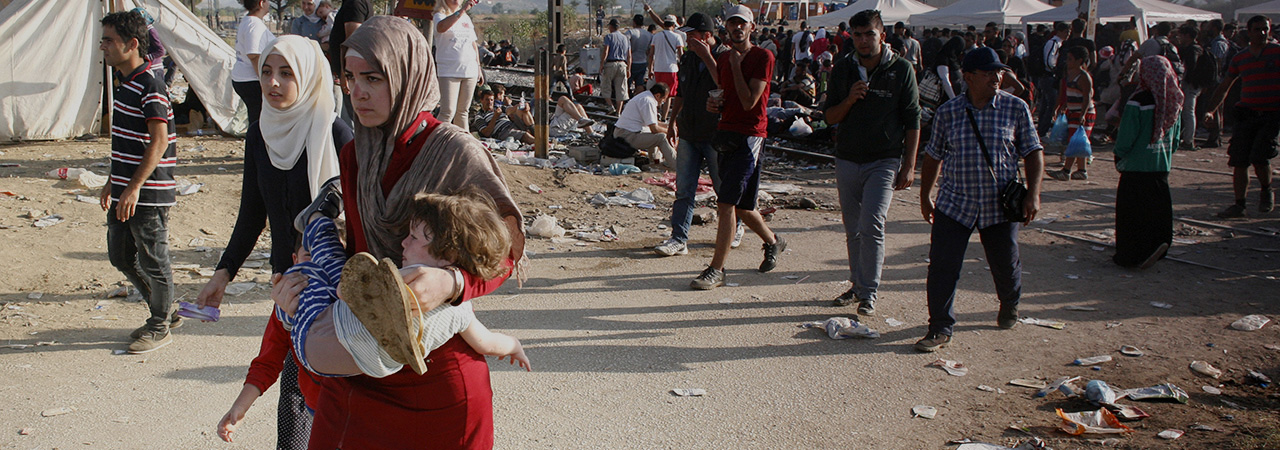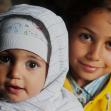

Media Center11 Things You May Not Know About Refugees
People in the United States have concerns about refugees coming here. We get that. We understand. But we also know that many Americans have strong misconceptions about just who refugees are, especially about Syrian refugees. Here are answers to the kinds of questions we often get – answers that may surprise you.
1. The administration proposed that the number of refugees coming into the United States be capped at 18,000. Isn't that a good thing? We can't be expected to solve the refugee crisis.
Put yourself in the shoes of a refugee. You’ve already gone through two years of vetting, have been approved and are finally ready to start a new life where you can raise your children in safety, and then are told you have to wait at least four more months, but maybe as long as two years. That’s a hardship on families that is difficult to bear – especially for Syrian refugees who have fled a traumatic war situation. Many refugees have already spent years without a steady job, permanent housing or schooling for their children. When you’re a refugee, four months is a very long time to be in limbo, especially when you have children – or you are a child about to be reunited with her parents.
2. Are Syrian refugees vetted? It seems to me it's about time we start vetting them.
The United States has had a vetting process for refugees for years. They already undergo a thorough, painstaking process before they are allowed into the United States. Candidates applying for asylum are screened by the Department of Homeland Security, the FBI, the State Department, and the National Counterterrorism Center. They undergo iris scans and their fingerprints are collected. Several interviews are conducted and repeated if necessary. The process can take as long as two years and involves 20 different steps. There are additional measures taken for Syrian refugees, making them the most vetted refugees in the world. More than 3 million refugees have been admitted to the United States since the 1970s. The vetting record is strong.
3. Why aren’t Muslim countries taking refugees?
Actually, predominately-Muslim countries are bearing most of the burden of the Syrian refugee crisis. According to the United Nations Refugee agency, 3.6 million refugees are in Turkey, while Jordan, Iran, Lebanon, and Pakistan combined have another 1.9 million refugees living in those countries. In Lebanon, one out of three people is a Syrian refugee. Though these are refugees who are not settling permanently, they still have a huge impact on already strained resources and infrastructure- schools, housing and other services. The 22,874 (41 from Syria) who were resettled in the United States in 2018 is a small number by comparison.
4. I’ve heard that most of the Syrian refugees coming here are men who are leaving their wives and children behind. Is that true?
That’s a common misunderstanding we hear a lot, but the truth is that nearly three-quarters of the Syrian refugees who came into the United States in 2016 were women and children. And close to half, 48 percent, are under the age of 14, according to the US Department of State’s Refugee Processing Center. The Office of Refugee Resettlement is a government agency that leads the process to bring refugees in the United States. The agency offers short-term assistance with basic needs such as finding a place to live and tips on how to integrate into American society. Non-profit groups, including the United States Conference of Catholic Bishops’ Migration and Refugee services, assists in the resettlement process.
5. Why should we take in Syrian refugees? I've heard most of them are terrorists trying to do us harm.
Many of the refugees are fleeing violence and terrorism. In Syria, people are left with almost no possessions as bombs destroyed their homes, shops, and hospitals. When we don't accept Syrian refugees, it hurts the very people trying to escape the terrorism that threatens their lives every day. It’s ironic that at the same time refugees are trying to flee terrorism in their lives and homeland, we confuse those same refugees with being terrorists themselves.
6. The government's role is to protect its people. Are you against making America safer?
The Catholic Church acknowledges that a government has an obligation to protect its people. But that must be balanced with our moral obligation to help others in need. Preventing vulnerable people like refugees from entering the United States is not the answer. No refugee has been convicted of a terrorist act in the United States. The existing and very robust refugee vetting process can continue while the administration reviews procedures. Desperate people are risking their lives to flee violence and persecution. They have no other choice. They are not coming here to commit violence – they are escaping it.
7. Why bring refugees to the United States? Wouldn't it be better to help refugees where they are, and help them go home, than to bring them here?
Catholic Relief Services (CRS) does help refugees where they are, in countries such as Greece, Jordan and Lebanon. We have assisted 1.5 million Iraqi and Syrian refugees with food, shelter, education and medical care. In a perfect world, it would be great for them to return home once the conflicts end. But take a look at Syria, for example. The war is still going on, and many cities and towns are in complete ruins. No one knows when those cities will be rebuilt. It could take decades. That’s why there needs to be a long-term solution to the refugee crisis. Resettlement is part of that solution.
8. Is CRS resettling refugees in the United States?
No. While CRS assists refugees overseas, we are not involved in resettling them here in the United States. Several non-profit groups are involved in the resettlement process, including faith-based organizations like our sister organization Catholic Charities, as well as the United States Conference of Catholic of Bishops’ Migration and Refugee Service.
9. CRS should stay out of politics and simply serve people in need. You’re getting way too political.
For us this isn't about politics – it’s about being a good neighbor to those in need, as Jesus calls us to be. We work with and assist refugees all around the world. It would be inconsistent of us to assist refugees in the countries they fled to but not stand up and speak for them when a policy here hurts them. We wouldn't be good neighbors if we remained silent in a situation that endangers them. Proverbs 31:8-9 speaks strongly to this very situation and calls on us to stand up and act.
10. Why are you standing up for Muslims now, but you haven’t said or done a thing when Christians are threatened?
We stand for people of all faiths when they are threatened, including Christians. In Iraq, we assist Christians and other religious minorities who are fleeing the Islamic State. The refugee resettlement system takes already religious persecution into account when it prioritizes the most vulnerable, and we think that’s important. But a religious test for who needs help or should be admitted into this country goes against our values. Also, prioritizing people based on their religion might put them at greater risk in their home country.
11. Some people use the word "refugees" while others use "immigrants." Are they the same thing?
Immigration is a broad umbrella term that is often used to encompass refugees. But refugees have a particular status that ensures their protection. In order to be considered a refugee, you must show that you have been forced to flee your country because of violence, war, persecution or a reasonable fear of persecution. You have to meet certain eligibility requirements to be declared a refugee. When a person is given legal refugee status, they enjoy certain protections from governments. Most importantly, they cannot be returned to the country from which they fled. An immigrant is a more general term for someone who goes to another country, often in search of work. Often people leave their home country for many reasons, and many people who may in fact need refugee protections may not be able to prove it.




